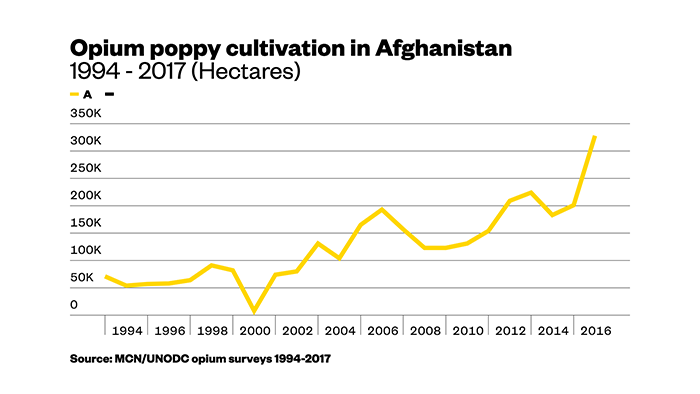



 Eric Walberg
Eric WalbergIt is time to think about the likely future of poor Afghanistan. It isn’t terribly bright, but we have to, so the sooner, the better.
There are probably still a few neocons dreaming of a happy puppet state emerging from the shambles. The “grand strategy” was laid out by the Project for a New American Century (PNAC) in 2000, calling for the US to maintain its unrivaled superpower status. This required a “new Pearl Harbor” to justify launching preemptive wars against suspect nations (after Afghanistan, Iraq, Syria, Lebanon, Somalia, Libya, Sudan, Iran, and Yemen).
This Pearl Harbor II just happened to come along a year later (9/11), prompting Bush II to coin “the Axis of Evil” to include Iran, Iraq, North Korea, and “Beyond the Axis of Evil” to include Cuba, Libya, and Syria. The plan was to bring all these countries under US hegemony by installing Western-friendly regimes under a patina of electoral democracy.
A skeptic might point out that none of these countries is any friendlier to the US 20 years later. There have been drastic changes, but so far only for the worse. That skeptic would point out that in fact the US has had a very spotty military record since WWII, which it “won” in Europe only after the Soviet army had subdued the Nazis, and against Japan only by using the first (and hopefully last) weapon of mass destruction on a massive scale, leveling two cities and killing 200,000 people in a few seconds.
There have been no “wars” since WWII. The Korean “war” was really just an invasion of a war-devastated nation to assert American control. It was actually a continuation of WWII, since no peace was signed with the Korean liberators, and is still ongoing, as Kim Jong un stubbornly insists on pointing out. At least it was called a war and the US Congress dutifully supported it.
Vietnam was a similar invasion to prop up the French colonial regime, but was never declared as a “war.” Despite attempts to rehabilitate it as an honorable war, no rational person sees it other than a huge stain on the US; 60,000 Americans died. The fallout continues, as the survivors among the 600,000 draftees are still getting treatment for battle injuries, especially PTSD.

Then there was the turkey shoot in 1991, called the first Iraq war. Again, it was not a war, but a loudly trumpeted and meticulously planned invasion, killing 100,000 turkeys (sorry, Iraqis), but only 383 Americans. “We have finally kicked the Vietnam syndrome,” Bush I famously bragged. A new, leaner, meaner US military was touted. It looked like the post-Soviet period, the 1990s, would be a useful “unipolar moment” to proceed with regime change, a blank check after 9/11 to cleanse the world of those evil axis types.
Reality is never kind. The unipolar moment disappeared without a trace (sorry, forgot Kosovo). The world in 2000 was in far worse shape than it was before the Soviet Union collapsed, before that unipolar moment came along.
PNAC and the 9/11 blank check was a last-ditch attempt to bring the world under US control. Yet another war was declared, “the war against terrorism,” another blank check, a war against a feeling (of dread). First stop: Afghanistan.
And in fact, almost all the nasties were invaded. Afghanistan, Iraq, Libya, Syria all experienced US soldiers, bombs and drones, and are all more or less paralyzed and devastated. Iran is too big a mouthful and has only had a very cold shoulder, plus subversion and support for Iranian terrorists. So far, it got off lucky.
Afghanistan was supposed to be simple. The Taliban just disappeared and the US set up shop. But then the Taliban resurged. The strategy to hold on was Vietnam-style counterinsurgency, but that didn’t work then or now.
What to do? There is only one way out now for Trump. Do a Nixon: negotiate, declare victory, and leave. The Taliban haven’t budged on their terms. They demanded direct talks with the US to arrange their departure. Only then would they talk to the current “government.” This was their position 18 years ago.
That is essentially what Nixon did in 1975 for Vietnam, though he carried out carpet bombing in Laos and Cambodia at the very end, hoping to cow the Vietnamese. It is unlikely Trump will do that, but who knows?
There will be a settling of accounts with the US-installed regime. The Taliban are still the official government (though only Saudi Arabia, the UAE, and Pakistan officially recognized them). The current Northern Alliance-led government will not just disappear, but it will not have an easy time finding a place.
In an attempt to give its invasion credibility and erase the memory of Taliban rule, the US parachuted in the last King of Afghanistan, Mohammed Zahir Shah, in 2002 to preside over a Loya Jirga, but then panicked, as many of the delegates were prepared to vote for Zahir Shah and block the US-backed Hamid Karzai. The US, represented by ZalmayKhalilzad, was able to twist enough arms to prevail.
The leaders since 2001 can only be described as US puppets. Hamid Karzai was a fundraiser in the 1980s for the mujahidin; Ashraf Ghani, an anthropology professor in the US and, in the 1990s, a World Bank official. At least Karzai recognized the Taliban initially, and was even requested by the Taliban to serve as their ambassador but refused, telling friends that he felt Pakistan’s Inter-Services Intelligence (ISI) was wrongly using them.

When Karzai threw in his lot with the Northern Alliance, the Taliban assassinated his brother. Ghani was working for the World Bank at the time. Not surprisingly, the Taliban did not negotiate with Karzai and are not likely to have a heart-to-heart reconciliation with Ghani.
The Taliban have not unveiled any election-ready platform. But what the Taliban have in mind is probably something along the lines of Iran: a modest electoral system under Shari‘ah law. They are salafi, mostly trained in Deobandi madrasahs in Pakistan, not as extreme as the Saudis, and with no tribal/monarchical pretensions. They never thought much of the Saudis, seen as compromised by their alliance with the US.
Despite (or because of) their intimate geopolitical ties with Pakistan, they are unlikely to take much advice from there. Pashtunistan is still a sore point, and Pakistan has little to offer, itself in dire economic straits. India, Iran, and Russia will be the most important regional actors, the UN the umbrella, though the Taliban will look to the Saudis for financing reconstruction. The Taliban have few foreign friends anymore, so they will have to do some serious rethinking.
There is no room for the US (or al-Qaeda) in this, except as part of an international program of reconstruction. If Syria is anything to go by (or Vietnam), that means zilch. The US motto in its “wars”: “Let them clean up the mess we made.”
The Taliban attended a conference in Moscow of regional countries — China, Iran, India, and Pakistan — in February, the first in which they have participated. The United States attended in an observer capacity, while the Kabul regime sent members of a government-appointed Peace Council.
The Taliban did not indulge in any negotiations with their foes, but merely called for the United States to undertake a number of “confidence-building measures,” starting with a deadline for a full withdrawal from the country.
It is fitting that the Taliban came to Moscow, capital of the Soviet invaders whom the mujahidin expelled, and that Zamir Kabulov, the last Soviet ambassador to Afghanistan, was the messenger who would tell the current invaders, the US, (no doubt with a feeling of schadenfreude) to get the hell out.
Kabulov passed on the bad news, “All political prisoners [must] be freed and anti-Taliban sanctions, which were imposed back in 1997, be lifted… With participation in the meeting, the international status of the Islamic Emirate will be strengthened even further.”
This, of course, is what the Taliban insisted on 18 years ago. So 18 years, $1.07 trillion, 2,372 US soldiers dead — for nothing? The US State Department is furious. Not only the dastardly Russians, Chinese, and Iranians, but wildcard Trump himself — all are ganging up against the US hegemon, undermining… What are they undermining? A failed state on US life-support? “State” just doesn’t get it. The Russians, Iranians, Indians, Pakistanis et al. are the regional powers who can make or break Afghanistan. The US has had almost two decades and all the counterinsurgency in the world isn’t going to help. Time to leave. Period.
Former US Ambassador to Afghanistan Ryan Crocker calls this “a surrender negotiation,” that is, the US surrender to the Taliban. Better to keep the troops there as long as necessary to get the conditions the US wants: the Taliban must recognize the US-installed government as the official government. The best the Taliban could expect is to be allowed to play at Western-style elections, which can always be arranged or cancelled.
This is what’s left of the PNAC plan for all the axis-of-evil types. It sort of worked in Iraq (until the Iranians came along). It didn’t work at all in Syria (what is Lebanon doing in the list?) or Somalia. It required destroying Libya and Yemen. Sudan and Iran are on hold.
So can Trump just pull a Nixon on all of them: declare victory and leave? Stop trying to be the world hegemon? Israel has been handed Jerusalem. Isn’t that parting gift enough?
